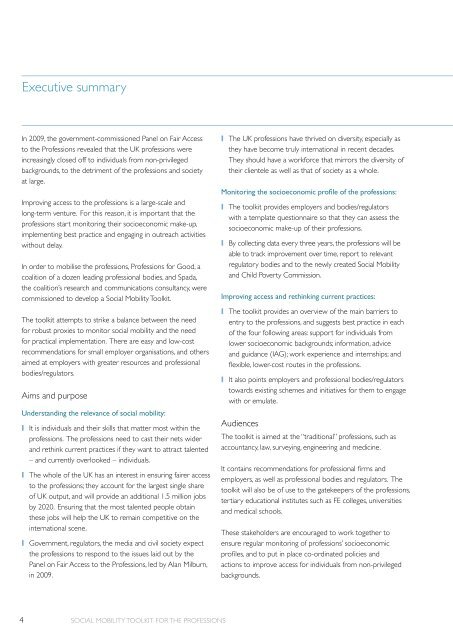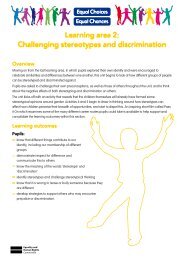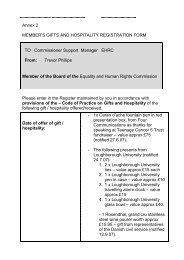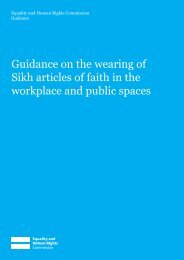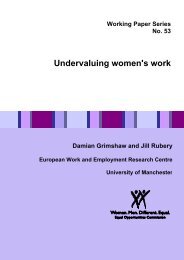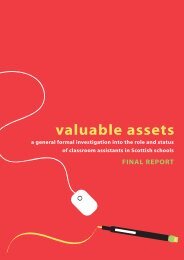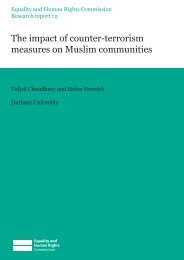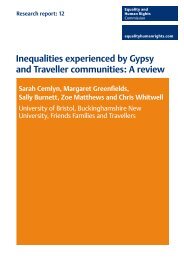Social Mobility Toolkit for the Professions - Equality and Human ...
Social Mobility Toolkit for the Professions - Equality and Human ...
Social Mobility Toolkit for the Professions - Equality and Human ...
You also want an ePaper? Increase the reach of your titles
YUMPU automatically turns print PDFs into web optimized ePapers that Google loves.
executive summary<br />
in 2009, <strong>the</strong> government-commissioned panel on Fair access<br />
to <strong>the</strong> professions revealed that <strong>the</strong> Uk professions were<br />
increasingly closed off to individuals from non-privileged<br />
backgrounds, to <strong>the</strong> detriment of <strong>the</strong> professions <strong>and</strong> society<br />
at large.<br />
improving access to <strong>the</strong> professions is a large-scale <strong>and</strong><br />
long-term venture. For this reason, it is important that <strong>the</strong><br />
professions start monitoring <strong>the</strong>ir socioeconomic make-up,<br />
implementing best practice <strong>and</strong> engaging in outreach activities<br />
without delay.<br />
in order to mobilise <strong>the</strong> professions, professions <strong>for</strong> Good, a<br />
coalition of a dozen leading professional bodies, <strong>and</strong> Spada,<br />
<strong>the</strong> coalition’s research <strong>and</strong> communications consultancy, were<br />
commissioned to develop a <strong>Social</strong> <strong>Mobility</strong> toolkit.<br />
<strong>the</strong> toolkit attempts to strike a balance between <strong>the</strong> need<br />
<strong>for</strong> robust proxies to monitor social mobility <strong>and</strong> <strong>the</strong> need<br />
<strong>for</strong> practical implementation. <strong>the</strong>re are easy <strong>and</strong> low-cost<br />
recommendations <strong>for</strong> small employer organisations, <strong>and</strong> o<strong>the</strong>rs<br />
aimed at employers with greater resources <strong>and</strong> professional<br />
bodies/regulators.<br />
aims <strong>and</strong> purpose<br />
Underst<strong>and</strong>ing <strong>the</strong> relevance of social mobility:<br />
� it is individuals <strong>and</strong> <strong>the</strong>ir skills that matter most within <strong>the</strong><br />
professions. <strong>the</strong> professions need to cast <strong>the</strong>ir nets wider<br />
<strong>and</strong> rethink current practices if <strong>the</strong>y want to attract talented<br />
– <strong>and</strong> currently overlooked – individuals.<br />
� <strong>the</strong> whole of <strong>the</strong> Uk has an interest in ensuring fairer access<br />
to <strong>the</strong> professions; <strong>the</strong>y account <strong>for</strong> <strong>the</strong> largest single share<br />
of Uk output, <strong>and</strong> will provide an additional 1.5 million jobs<br />
by 2020. ensuring that <strong>the</strong> most talented people obtain<br />
<strong>the</strong>se jobs will help <strong>the</strong> Uk to remain competitive on <strong>the</strong><br />
international scene.<br />
� Government, regulators, <strong>the</strong> media <strong>and</strong> civil society expect<br />
<strong>the</strong> professions to respond to <strong>the</strong> issues laid out by <strong>the</strong><br />
panel on Fair access to <strong>the</strong> professions, led by alan Milburn,<br />
in 2009.<br />
4 <strong>Social</strong> <strong>Mobility</strong> toolkit For <strong>the</strong> proFeSSionS<br />
� <strong>the</strong> Uk professions have thrived on diversity, especially as<br />
<strong>the</strong>y have become truly international in recent decades.<br />
<strong>the</strong>y should have a work<strong>for</strong>ce that mirrors <strong>the</strong> diversity of<br />
<strong>the</strong>ir clientele as well as that of society as a whole.<br />
Monitoring <strong>the</strong> socioeconomic profile of <strong>the</strong> professions:<br />
� <strong>the</strong> toolkit provides employers <strong>and</strong> bodies/regulators<br />
with a template questionnaire so that <strong>the</strong>y can assess <strong>the</strong><br />
socioeconomic make-up of <strong>the</strong>ir professions.<br />
� by collecting data every three years, <strong>the</strong> professions will be<br />
able to track improvement over time, report to relevant<br />
regulatory bodies <strong>and</strong> to <strong>the</strong> newly created <strong>Social</strong> <strong>Mobility</strong><br />
<strong>and</strong> child poverty commission.<br />
Improving access <strong>and</strong> rethinking current practices:<br />
� <strong>the</strong> toolkit provides an overview of <strong>the</strong> main barriers to<br />
entry to <strong>the</strong> professions, <strong>and</strong> suggests best practice in each<br />
of <strong>the</strong> four following areas: support <strong>for</strong> individuals from<br />
lower socioeconomic backgrounds; in<strong>for</strong>mation, advice<br />
<strong>and</strong> guidance (iaG); work experience <strong>and</strong> internships; <strong>and</strong><br />
flexible, lower-cost routes in <strong>the</strong> professions.<br />
� it also points employers <strong>and</strong> professional bodies/regulators<br />
towards existing schemes <strong>and</strong> initiatives <strong>for</strong> <strong>the</strong>m to engage<br />
with or emulate.<br />
audiences<br />
<strong>the</strong> toolkit is aimed at <strong>the</strong> “traditional” professions, such as<br />
accountancy, law, surveying, engineering <strong>and</strong> medicine.<br />
it contains recommendations <strong>for</strong> professional firms <strong>and</strong><br />
employers, as well as professional bodies <strong>and</strong> regulators. <strong>the</strong><br />
toolkit will also be of use to <strong>the</strong> gatekeepers of <strong>the</strong> professions,<br />
tertiary educational institutes such as Fe colleges, universities<br />
<strong>and</strong> medical schools.<br />
<strong>the</strong>se stakeholders are encouraged to work toge<strong>the</strong>r to<br />
ensure regular monitoring of professions’ socioeconomic<br />
profiles, <strong>and</strong> to put in place co-ordinated policies <strong>and</strong><br />
actions to improve access <strong>for</strong> individuals from non-privileged<br />
backgrounds.


